If you have ever wondered whether you would enjoy gardening, then you have come to the right place. Gardening is a rewarding and fulfilling hobby that allows you to connect with nature and unleash your creativity. It offers a hands-on, immersive experience that brings you closer to the wonders of Allah’s creation. Whether you have a spacious backyard or a small balcony, gardening can be enjoyed by individuals of all ages and skill levels.
Gardening provides many benefits, not only for your physical well-being but also for your mental and emotional health. It is a great way to relax, reduce stress, and find solace in nature. By nurturing plants and watching them grow, you can experience a sense of accomplishment and joy.
Key Takeaways:
- Gardening is a rewarding and fulfilling hobby that allows you to connect with nature.
- Gardening provides numerous benefits for physical, mental, and emotional well-being.
- You don’t need a large space to enjoy gardening; it can be done in small balconies or even indoors.
- Gardening teaches important life lessons such as responsibility, patience, and resilience.
- Start small, be forgiving of mistakes, and trust the process.
Getting Started: Gardening Tips for Beginners
If you are new to gardening or considering starting your own garden, don’t worry, it’s easier than you think! Here are some helpful tips to get you started on your gardening journey.
1. Start Small: Begin with a small area or a few pots so you don’t overwhelm yourself. This will allow you to learn and experiment without feeling too much pressure.
2. Choose the Right Location: Find a spot in your yard or balcony that gets at least 6-8 hours of sunlight a day. Most plants need sunlight to grow and thrive, so make sure you select an appropriate spot.
3. Prepare the Soil: Good soil is the foundation for a successful garden. Remove any weeds or grass from the area and add compost or organic matter to improve the soil’s fertility and drainage.
4. Select Suitable Plants: Choose plants that are well-suited to your climate and the specific conditions of your garden. Consider factors such as sunlight, temperature, and soil type when making your selections.
5. Watering: Proper watering is essential for plants to grow. Water your plants regularly, ensuring the soil is moist but not waterlogged. To determine when to water, stick your finger into the soil and check for moisture.
6. Learn from Your Plants: Pay attention to your plants and learn their needs. Observe how they respond to different conditions and adjust your gardening practices accordingly. Gardening is a journey of continuous learning and adaptation.
Remember, gardening is a rewarding and fulfilling hobby. Don’t be afraid to make mistakes and learn from them. Enjoy the process of watching your garden grow and flourish. Happy gardening!
Unleashing Your Creativity: Gardening Ideas to Transform Your Yard
Are you looking to add a touch of magic to your outdoor space? Get ready to unleash your creativity with these inspiring gardening ideas that will transform your yard into a captivating oasis. Whether you have a spacious garden or a cozy balcony, there are endless possibilities to create a beautiful and inviting space that reflects your personality and style. Let’s explore some gardening techniques and ideas that will take your yard to the next level!
Creative Plant Combinations
One way to elevate your garden’s aesthetic appeal is by experimenting with unique plant combinations. Play with contrasting colors, textures, and heights to create visually stunning displays. For instance, pairing vibrant red roses with delicate white daisies can create a striking visual impact. Consider incorporating different types of foliage, such as broad-leafed plants and ornamental grasses, to add depth and visual interest to your garden.
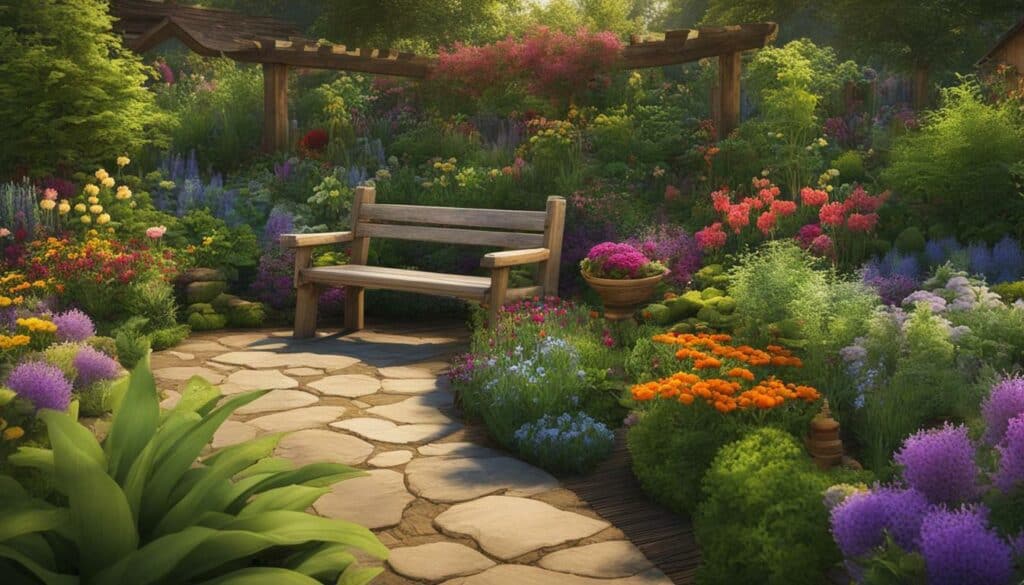
Theme-Based Gardens
Another exciting way to transform your yard is by creating theme-based gardens. Choose a theme that resonates with you, whether it’s a serene Japanese-inspired garden, a vibrant tropical paradise, or a charming cottage garden. Research plants, decorations, and design elements that align with your chosen theme and bring it to life in your yard. Incorporate elements like stone pathways, water features, and themed ornaments to create a cohesive and immersive garden experience.
Vertical Gardening
If you have limited space, don’t let that stop you from indulging in your gardening passion. Vertical gardening is a fantastic solution for small yards or balconies. Hang planters on walls or fences, use trellises for climbing plants, and install vertical plant stands to maximize your space. Not only will this add visual interest to your outdoor area, but it will also provide more room for a diverse range of plants.
As you embark on your gardening journey, remember that experimentation is key. Don’t be afraid to try new techniques, mix and match different plants, and embrace your own unique gardening style. Let your imagination run wild, and watch as your yard transforms into a breathtaking oasis that will bring you joy and satisfaction for years to come.
| Gardening Ideas | Gardening Techniques |
|---|---|
| Create unique plant combinations | Experiment with contrasting colors, textures, and heights |
| Design theme-based gardens | Research and incorporate elements that align with the chosen theme |
| Try vertical gardening | Utilize wall planters, trellises, and vertical plant stands |
Indoor Gardening: Bringing the Green Inside Your Home
Love gardening but don’t have a big yard? Don’t worry, you can still enjoy the pleasures of gardening by bringing the green inside your home with indoor gardening. Whether you live in an apartment or have limited outdoor space, indoor gardening allows you to cultivate plants and create a thriving green oasis right inside your living space.
Indoor gardening offers a wide range of possibilities, from potted plants on windowsills to vertical gardens and hanging planters. It not only adds beauty and freshness to your home but also provides numerous benefits for your well-being. Plants help purify the air, boost oxygen levels, and create a calming atmosphere, promoting a healthier indoor environment.
To successfully create an indoor garden, it’s important to choose the right plants that thrive in low light conditions and adapt well to indoor settings. Some popular choices include spider plants, pothos, snake plants, and peace lilies. These plants are known for their ability to tolerate low light and require minimal maintenance.
| Indoor Gardening Tips |
|---|
| 1. Select plants suitable for indoor gardening, considering their light and humidity requirements. |
| 2. Provide adequate drainage for your potted plants to prevent root rot. |
| 3. Water your indoor plants regularly, but be careful not to overwater them. |
| 4. Place your plants near natural light sources, such as windows or skylights. |
| 5. Consider using grow lights to supplement natural light for plants that require more light. |
| 6. Use well-draining potting soil and fertilize your plants as needed. |
| 7. Regularly clean your plants’ leaves to remove dust and maintain their health. |
With a little creativity and care, you can transform any corner of your home into a lush indoor garden. So why wait? Start your indoor gardening journey today and enjoy the beauty and benefits of plants all year round.
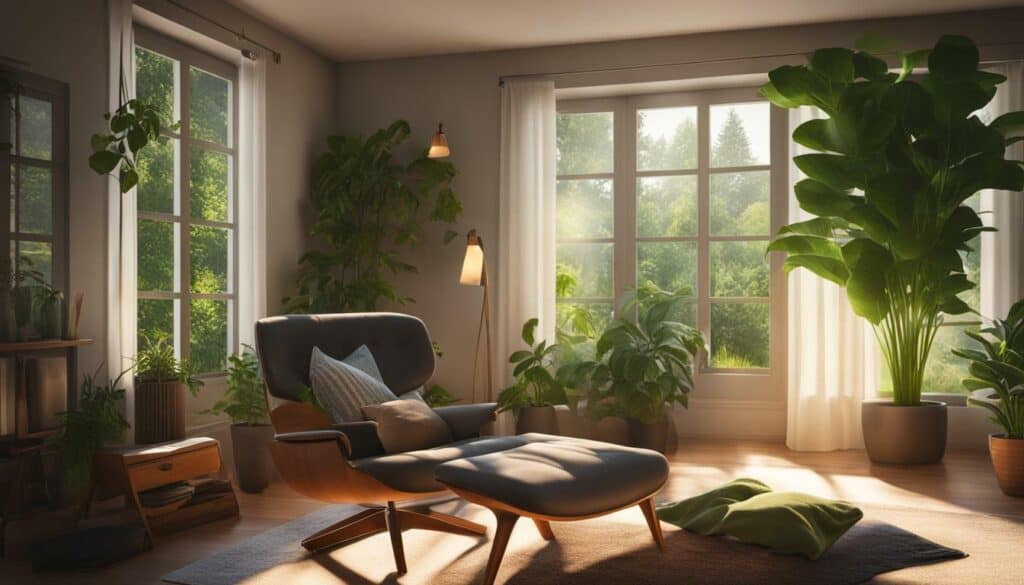
Going Organic: Embracing Sustainable Gardening Practices
Looking to take your gardening to the next level? Embrace the wonders of organic gardening and cultivate a sustainable garden that nurtures both you and the environment. Organic gardening is a holistic approach that emphasizes the use of natural methods and materials to promote healthy plant growth while minimizing harm to the ecosystem.
When you choose organic gardening, you say goodbye to synthetic fertilizers, pesticides, and genetically modified organisms. Instead, you rely on compost, organic fertilizers, and natural pest control methods to create a thriving garden that is in harmony with nature. This not only benefits the soil and the plants but also ensures the safety of pollinators, beneficial insects, and other wildlife.
One of the keys to successful organic gardening is building and maintaining healthy soil. By enriching your soil with organic matter like compost and aged manure, you create a nourishing environment for plants to grow and thrive. Additionally, practicing crop rotation and intercropping helps prevent the buildup of pests and diseases, reducing the need for chemical interventions.
With organic gardening, you can grow a wide variety of fruits, vegetables, herbs, and flowers. From juicy tomatoes to fragrant roses, your organic garden will offer an abundance of delicious and beautiful rewards. So, grab your gardening gloves and let’s embrace the wonders of organic gardening together!
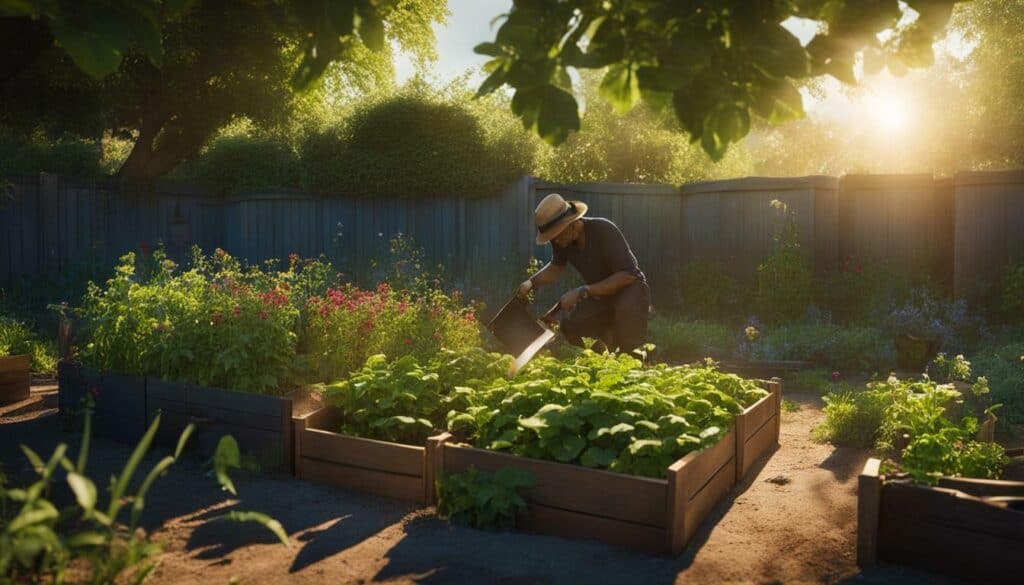
| Benefits of Organic Gardening | Organic Gardening Tips |
|---|---|
|
|
By adopting organic gardening practices, you can enjoy a bountiful harvest while minimizing your impact on the environment. Connect with nature, nurture your plants, and reap the rewards of a sustainable garden that benefits both you and the world around you!
Urban Gardening: Greening Up Your Cityscape
Living in a city doesn’t mean you can’t have a green thumb. Discover the world of urban gardening and learn how to turn your urban space into a thriving oasis of plants and beauty. Urban gardening is a growing trend that allows city dwellers to enjoy the benefits of gardening even in limited spaces. Whether you have a small balcony, rooftop, or even a community garden, there are plenty of creative ways to unleash your green thumb.
One popular urban gardening technique is vertical gardening, which maximizes space by growing plants vertically. You can use hanging pots, wall-mounted planters, or trellises to create a vertical garden that adds a touch of green to any vertical surface. This technique is perfect for those with limited floor space, as it allows you to utilize walls and fences to grow a variety of plants.
Another option for urban gardeners is container gardening. This involves using pots and containers to grow plants instead of traditional garden beds. Container gardening is versatile and allows you to experiment with different plant choices and styles. You can create a beautiful container garden by combining plants of different colors, shapes, and sizes to create a stunning visual display.
| Benefits of Urban Gardening |
|---|
| 1. Beautifies the urban environment |
| 2. Improves air quality |
| 3. Provides fresh and organic produce |
| 4. Reduces stress and promotes well-being |
| 5. Creates a sense of community |
Urban gardening not only brings beauty to the concrete jungle but also offers a range of benefits. It helps improve air quality by absorbing pollutants and releasing oxygen, making the urban environment healthier for everyone. Additionally, growing your own produce in urban settings allows you to enjoy fresh and organic food right at your doorstep. This can save you money and reduce your carbon footprint.
Furthermore, urban gardening provides a sense of peace and tranquility in the midst of the hustle and bustle of city life. Taking care of plants and watching them grow can be a therapeutic experience, reducing stress and promoting emotional well-being. Moreover, urban gardening can bring communities together, fostering a sense of camaraderie and connection among neighbors.
Tips for Successful Urban Gardening
- Choose plants that are suited to your specific urban environment and climate.
- Utilize vertical space by incorporating trellises, hanging pots, or wall-mounted planters.
- Create a watering schedule to ensure your plants receive adequate moisture.
- Use high-quality potting soil and fertilizers to provide essential nutrients to your plants.
- Protect your plants from pests by implementing natural pest control methods.
By following these tips, you can create a thriving urban garden that brings beauty, freshness, and joy to your cityscape. So, don’t let limited space deter you from embracing the joys of gardening. Start your urban gardening journey today and transform your urban space into a green haven.
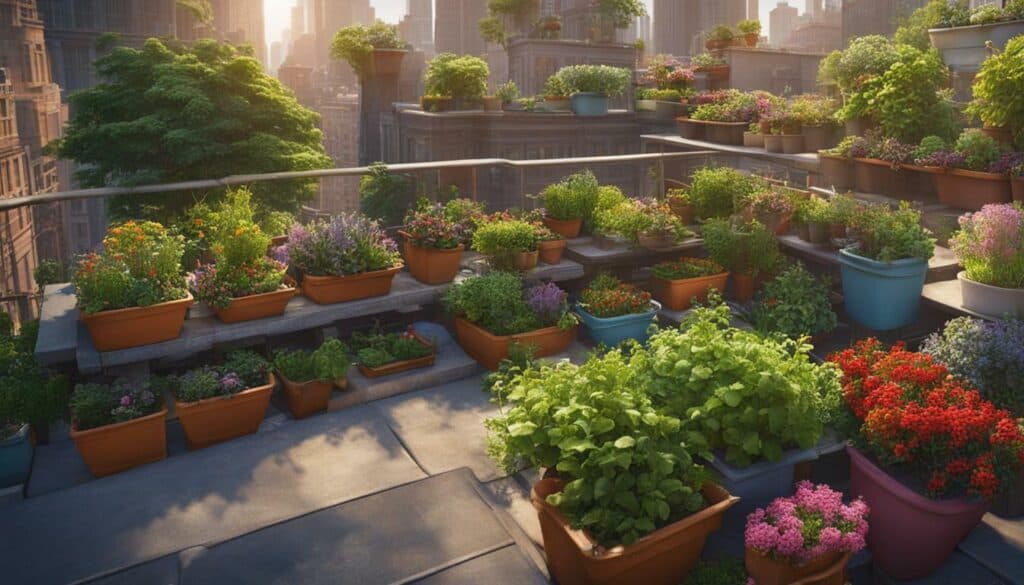
Must-Have Gardening Tools and Equipment
Just like any craft, gardening requires the right tools. Equip yourself with these must-have gardening tools to ensure you have everything you need for a successful gardening experience.
1. Garden Gloves: Protect your hands from dirt, thorns, and blisters with a sturdy pair of garden gloves. Look for gloves made from durable, breathable materials that provide a good grip.
2. Trowel: A trowel is a versatile tool that is essential for digging, planting, and transferring plants. Look for one with a comfortable grip and a durable blade.
3. Pruners: Pruners are a must-have for maintaining healthy plants. Use them to trim back overgrown branches, deadhead flowers, and shape shrubs. Look for pruners with a sharp blade and a comfortable handle.
4. Watering Can: Keep your plants hydrated with a watering can. Look for one with a long spout that allows for precise watering and a comfortable handle for easy carrying.
5. Garden Rake: A garden rake is essential for leveling soil, removing leaves and debris, and preparing the ground for planting. Look for one with sturdy tines and a comfortable handle.
6. Hand Pruners: Hand pruners are smaller, more portable versions of pruners. They are perfect for delicate pruning tasks like deadheading flowers and shaping small plants. Look for ones with a sharp blade and ergonomic design.
7. Garden Fork: A garden fork is useful for loosening compacted soil, aerating the roots, and turning compost. Look for one with strong tines and a comfortable handle.
8. Garden Hoe: A garden hoe is essential for removing weeds, breaking up soil, and creating furrows for planting. Look for one with a sharp blade and a comfortable handle.
9. Kneeling Pad: Protect your knees from strain and discomfort with a cushioned kneeling pad. Look for one that is thick and waterproof to provide maximum comfort and durability.
10. Garden Wheelbarrow: A garden wheelbarrow is perfect for transporting heavy soil, plants, and other gardening materials. Look for one with a sturdy frame, large capacity, and pneumatic tires for easy maneuverability.
| Gardening Tools and Equipment | Description |
|---|---|
| Garden Gloves | Protects hands from dirt, thorns, and blisters |
| Trowel | Used for digging, planting, and transferring plants |
| Pruners | Trim back overgrown branches and deadhead flowers |
| Watering Can | Keeps plants hydrated with precise watering |
| Garden Rake | Levels soil and removes leaves and debris |
| Hand Pruners | Used for delicate pruning tasks |
| Garden Fork | Loosens compacted soil and turns compost |
| Garden Hoe | Removes weeds and breaks up soil |
| Kneeling Pad | Provides cushioning and comfort for knees |
| Garden Wheelbarrow | Transports heavy gardening materials |
The Therapeutic Power of Gardening
Gardening is not just a hobby; it’s a therapeutic journey that can nurture your mind, body, and soul. Discover the incredible power of gardening to bring peace and serenity into your life. Whether you have a small backyard or a few pots on your balcony, immersing yourself in the natural world can have profound positive effects on your well-being.
Research has shown that spending time in nature and engaging in gardening activities can reduce stress levels, lower blood pressure, and improve overall mental health. The act of tending to plants, whether it’s planting seeds, pruning, or watering, can be meditative and provide a sense of purpose and fulfillment. The fresh air, the scent of flowers, and the gentle sounds of nature create a calming environment that allows you to escape the noise and distractions of everyday life.
Gardening also offers a sense of connection and belonging. As you care for your plants and witness their growth and transformation, you become more attuned to the cycles of life and the natural world around you. It can provide a sense of responsibility and accomplishment as you witness the fruits of your labor and see the beauty you’ve created.
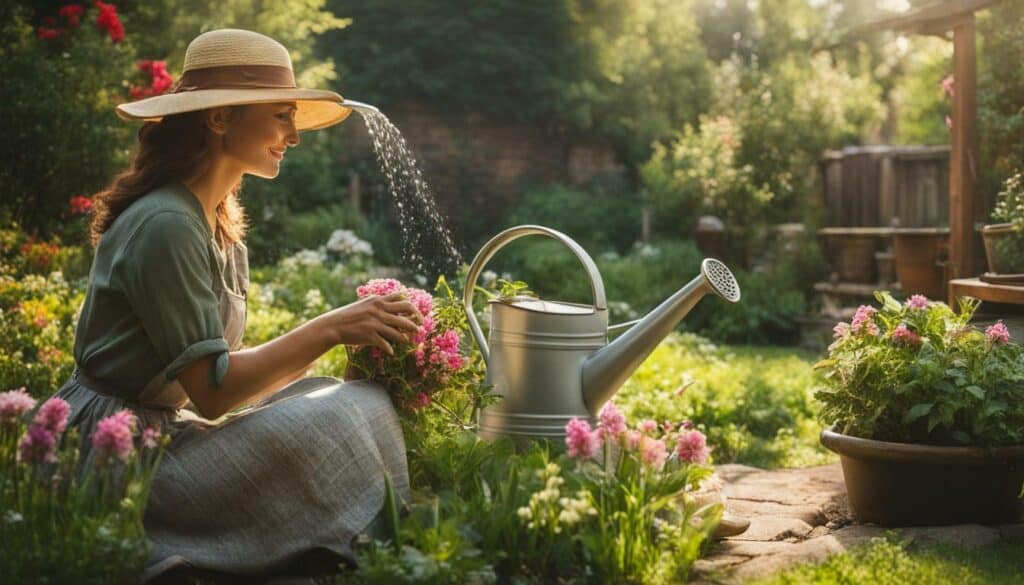
Creating a Peaceful Garden Retreat
To fully embrace the therapeutic benefits of gardening, consider creating a peaceful garden retreat in your outdoor space. You can incorporate elements like comfortable seating, soothing water features, and fragrant plants to create a tranquil atmosphere. Surround yourself with colors, textures, and scents that bring you joy and relaxation. Use natural materials like wood and stone to add a sense of grounding and harmony to your garden design.
“In every walk with nature one receives far more than he seeks.” – John Muir
By dedicating time to your garden and immersing yourself in its nurturing presence, you can find solace and tranquility amidst the chaos of everyday life. The therapeutic power of gardening is truly remarkable, offering a sanctuary for your mind, body, and soul.
| Benefits of Gardening | Gardening Tips |
|---|---|
| Reduces stress levels | Start small and build your garden gradually |
| Improves mental health | Experiment with different plants and gardening techniques |
| Provides a sense of purpose and fulfillment | Take time to observe and connect with nature |
| Creates a peaceful and serene environment | Make gardening a regular part of your self-care routine |
Conclusion
Whether you already love gardening or are just discovering your passion for it, remember that gardening is a beautiful adventure waiting to be explored. Embrace the joys of nurturing plants, connecting with nature, and creating your own green haven. Start your gardening journey today and experience the wonders it can bring into your life.
Gardening offers a hands-on, immersive experience that brings children closer to nature and allows them to appreciate Allah’s greatness. It provides many benefits for a child’s development and education. Gardening with kids can teach them about nature, plant life cycles, photosynthesis, and the importance of soil and water for plant growth. It also encourages healthy eating habits, enhances environmental awareness, promotes physical activity and motor skills, sparks curiosity and learning, cultivates patience, responsibility, and resilience, and enhances emotional well-being.
Learning how to garden is not about having a special talent but rather having a sincere interest, a burning desire, and an open mind and heart. Gardening is a beautiful journey that allows individuals to connect with nature and experience joy and exploration. Start small, be forgiving of mistakes, follow your plants, and trust the process.
So, whether you have a sprawling backyard or a cozy balcony, gardening offers endless possibilities to unleash your creativity, reap the rewards of your hard work, and find solace amidst the chaos of everyday life. Grab a shovel, get your hands dirty, and let the magic of gardening transform your life.
How Can Gardening Help Us Grow and Explore New Joys Together?
Engaging in gardening can be a beautiful way of exploring growth in gardening and discovering new joys together. Tackling the tasks of nurturing plants as a team not only enhances your bond but also allows you to witness the progress and transformation of your garden. From the excitement of sprouting seeds to the satisfaction of harvesting, gardening brings endless possibilities for growth and shared happiness.
FAQ
Q: Do I need any special gardening skills to start?
A: No, gardening is a hobby that anyone can enjoy. All you need is a sincere interest, a burning desire to learn, and an open mind and heart.
Q: Can I garden in any season?
A: Yes, gardening can be done all year round. Depending on the season, you can grow various crops and adapt your gardening techniques accordingly.
Q: How can gardening benefit my child’s development?
A: Gardening with kids can teach them about nature, plant life cycles, photosynthesis, and the importance of soil and water for plant growth. It also encourages healthy eating habits, enhances environmental awareness, promotes physical activity and motor skills, sparks curiosity and learning, cultivates patience, responsibility, and resilience, and enhances emotional well-being.
Q: What are some easy plants to start with for beginners?
A: Some easy plants for beginners include herbs like basil and mint, flowers like marigolds and zinnias, and vegetables like cherry tomatoes and lettuce. These plants are relatively low-maintenance and can be grown in pots or small garden spaces.
Q: How can I garden in a small space like a balcony or rooftop?
A: Urban gardening is a great solution for small spaces. You can use containers, hanging baskets, or vertical gardening techniques to maximize your space. Choose compact plants and adapt your gardening practices to suit the environment.
Q: What are some essential gardening tools I should have?
A: Some essential gardening tools include a shovel, pruners, gloves, watering can or hose, and a trowel. These tools will help you with tasks like digging, pruning, watering, and planting.
Q: Can gardening be therapeutic?
A: Yes, gardening has been shown to have therapeutic benefits. It can reduce stress, improve mood, promote mindfulness, and provide a sense of accomplishment. Creating a peaceful and calming garden space can enhance these therapeutic effects.


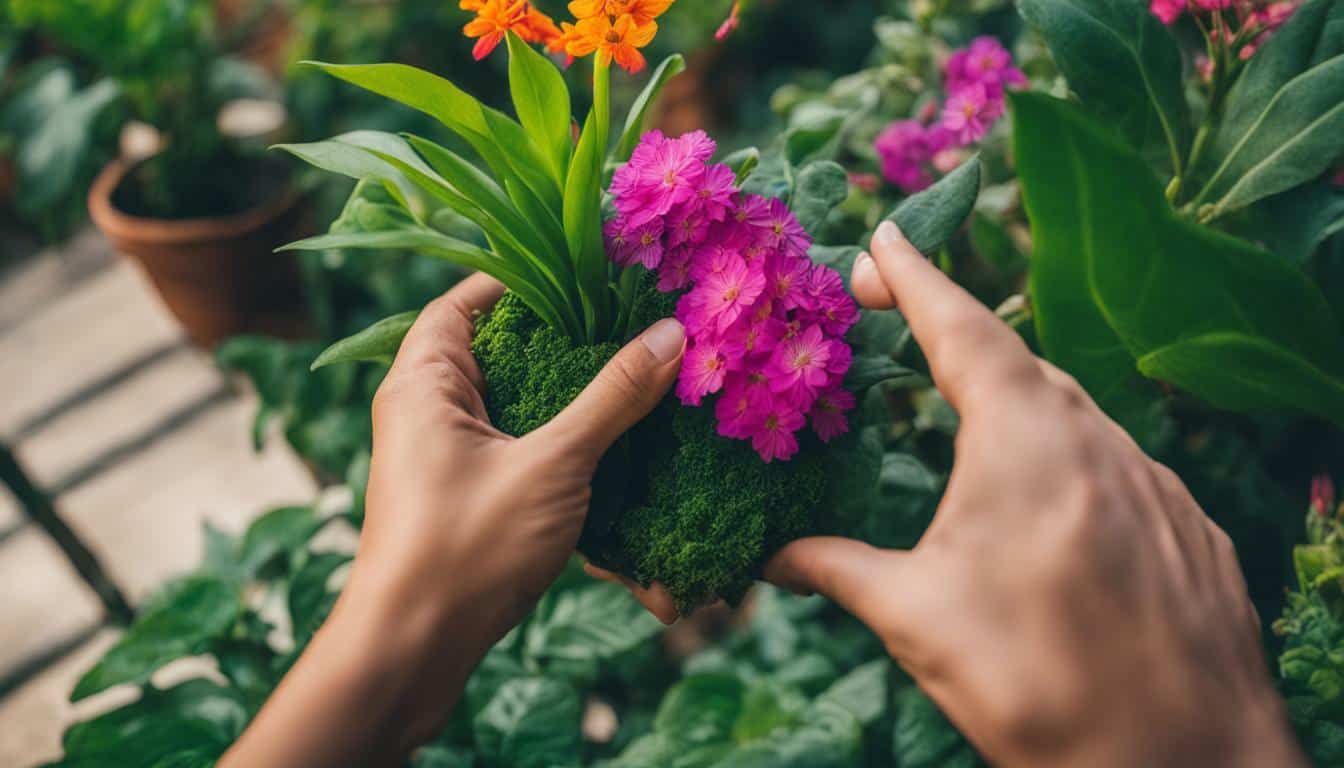
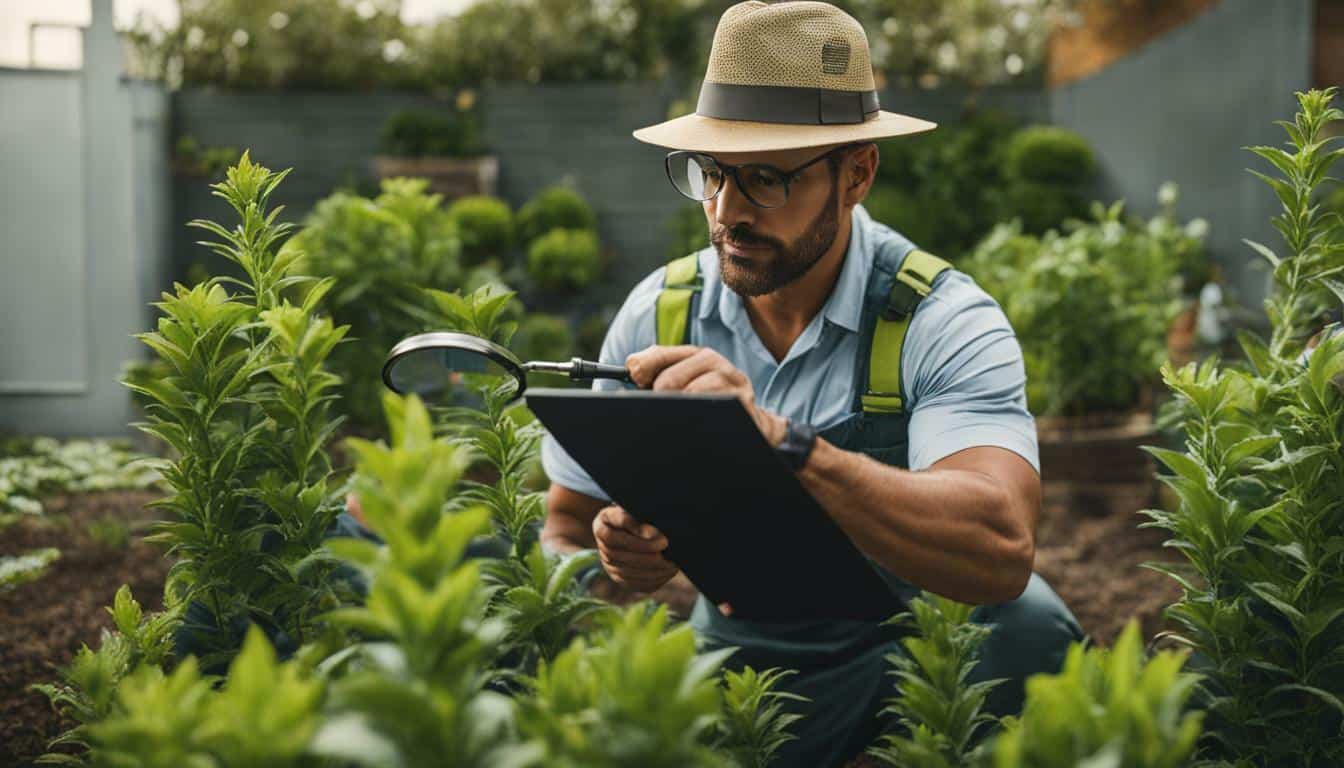

Leave a Reply